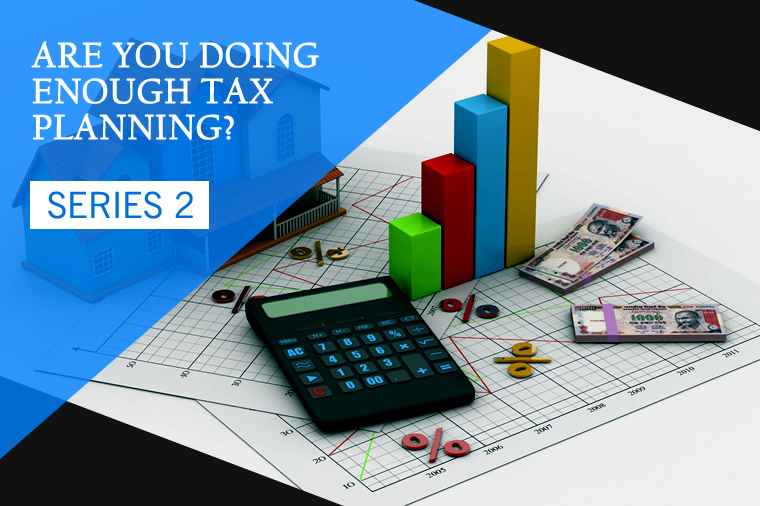SERIES 2- Are You Doing Enough Tax Planning?

Last Updated : March 17, 2017, 12:52 p.m.
In my first series, I had discussed on the ways to save taxes by restructuring the CTC. In this series, I have focused on other deductions available to a salaried individual and how you can save taxes under other heads, namely, House Property, Other Sources and Capital Gains.
Read – Series 1 – Tax Planning?
Deductions:
There are certain deductions that are made available to individual taxpayers. I have made an attempt to discuss the major ones, as below:
- Deductions under section 80C:
- FD:
You can invest into Tax Saving Fixed Deposits. There is no difference between Tax Saving Fixed Deposits and Regular Fixed Deposits except that the former has a lock in period of 5 years. However, keep in mind that interest on both kinds is taxable.
- FD:
- Life insurance:
This is the most common tax saving option for almost all individuals. Payment of premium towards spouse and children are also included here.
- NSC:
You can also invest into NSC. This is also issued for a period of 5 years and the interest rate is also quite high @ 8.5%. However, the interest is not tax free!
- Contribution to EPF:
Employees’ contribution towards Provident fund is completely tax free.
- Tution fees:
Tution fees for maximum two children can also be claimed as a deduction. However, you should keep in mind that only tution fees is included and not the complete school fees.
- Principal payment for your home loan:
If you have taken a home loan, this can be a very useful deduction as the limit is upto INR 150,000.
Compare these options based on your risk appetite and expected return. You should be able to make a well informed cost benefit analysis and invest accordingly. Also, keep in mind that the total limit under this section is upto INR 150,000 .
- Deductions under section 80D for medical insurance:
Under this, you can claim a deduction of the health insurance premium subject to specified limits as given below:
- Upto 25,000 for self, spouse and dependent children
- Upto 25,000 for parents, if none of them is a senior citizen
- Upto 30,000 for parents, if one of them is a senior citizen
Thus, you can claim a tax deduction for the premium payment of your family and parents separately.
Also, you can claim a tax deduction for the expense of health check-up. The maximum deduction allowed in this however is little lower at INR 5,000. The health check-up can be of yourself, your family or your parents. Please be cautious here that the deduction of INR 5,000 is not individual, it is the aggregate expense on health check-ups of your family. For instance, if you and your father go for a health check-up and spend a total of INR 5,000, you can claim a deduction of only upto INR 5,000.
- Deductions under section 80G for donations:
Your noble work is also getting you some tax benefits! 100% or 50% of the donations made will be allowed as a deduction depending on the type of recognition received by the charitable organization. However, you must have the copy of receipt as well as a copy of the income tax certificate qualifying them for 80G deduction. Quoting of PAN of the institute is also equally important to claim the deduction.
- Deduction under section 80E for Education loan:
If you are planning for higher education, consider getting an education loan for the same as it is eligible for tax deduction. However, the loan should be only for self, spouse or children (dependent/independent) and should be taken only from an approved financial institution .
- Deduction under section 80TTA for savings interest:
The recent deduction provided by the government is a huge relief for the people at large. Savings interest upto INR 10,000 is exempt. It is imperative to note here that only savings interest is exempt and not fixed deposit interest.
Income from House Property:
Interest payment for your home loan can be claimed upto INR 200,000 even though you are availing exemption under HRA. However, this can only happen when you are working in some other city and you are paying loan for a home in another city. However, you would need to show the interest certificate which is easily available from the bank.
In fact, with Budget 2016, it is proposed to give an additional deduction of interest on home loans of INR 50,000 per annum. However, one needs to be cautious of the below mentioned conditions, which needs to be cumulatively satisfied:
- Value of house property is less than INR 50 lakhs
- Loan amount is upto INR 35 lakhs which is sanctioned during FY 2016-17
The benefit is extended till the repayment of loan continues and the loan can be taken from any institution.
This deduction is over and above the deduction of INR 200,000 discussed above.
Income from Capital Gains:
If you are also earning some capital gains on your investment, you would need to pay capital gains tax on the same. However, if you invest in equity shares and equity oriented Mutual Funds for more than a year, it would be completely tax free, provided the same are listed on a recognized stock exchange.
Also, capital losses are allowed to be set off against capital gains, if any.
Income from Other Sources:
Dividends received are also tax free, provided the same is received from a domestic company. Also, amounts received as gifts on the occasion of your marriage or by a relative or under a will is completely tax free.
I hope this series of blog has thrown light on some of the basic ways to save your taxes. My parting advice to all of you is-
Do not procrastinate your investment plan till the last minute and you can make some wealth in addition to saving huge taxes!